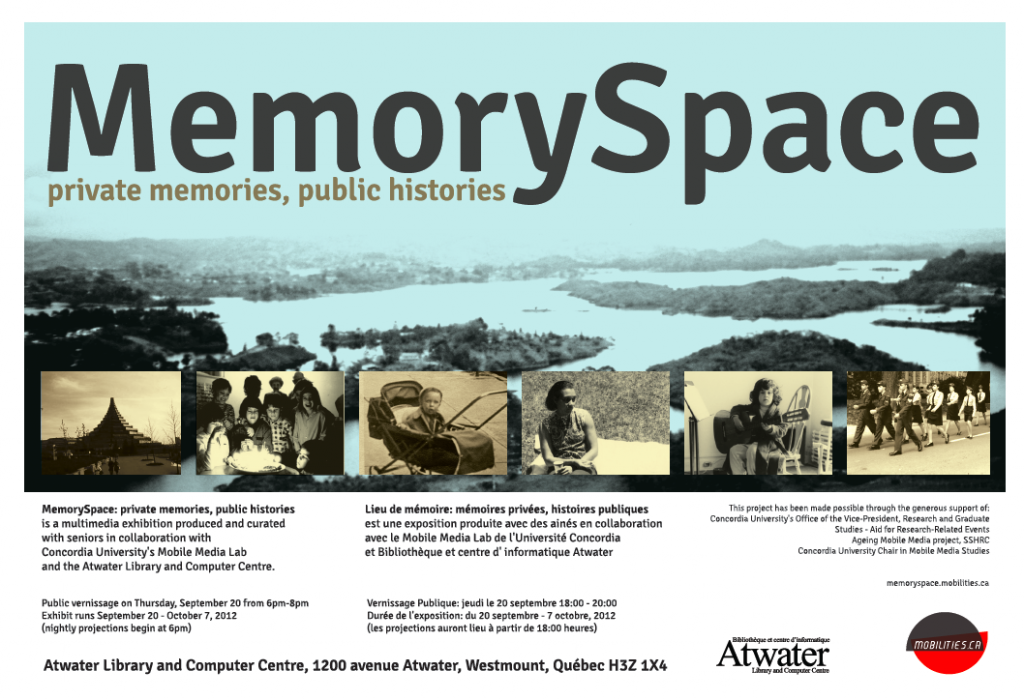
How do we remember and commemorate the history of a neighbourhood? How might the personal memories of a location, captured in the home or family photograph, intersect with the history of a public space? How might we use these questions to explore, with a community of seniors, a collaborative curatorial project and set of workshops that promote digital literacy and collaborative creativity? These are the questions at the core of the participatory media project and public exhibition, MemorySpace: private memories, public histories. To see the documentation of this project, please visit memoryspace.mobilities.ca.
The first MemorySpace exhibition was a collaboration between the Montreal’s Mobile Media Lab with the Atwater Library and Computer Centre (ALCC).
The Library has a fascinating history connected to its location. Housed in a heritage building near the corner of Ste-Catherine and Atwater Avenue, it sits at the intersection of several diverse neighbourhoods, including: downtown Montreal, Little Burgundy, St Henri, and Westmount. Originally founded as the Montreal Mechanics’ Institute in 1828, the Atwater Library has provided vocational training and library services for over 180 years. As a non-profit, member-supported library, it continues to serve patrons of diverse ages and economic and cultural backgrounds, including seniors, new immigrants, and refugees. This curatorial project builds on the Mobile Media Lab’s on-going collaborations with the Atwater Library, their peer-to-peer learning mandate, as well as our commitment to curating for public space (following our successful Nuit Blanche event, with DHC/Art, February, 2012).
Our main target audience for participants and for the exhibition was the community involved in the ALCC and its surrounding neighbourhood, with seniors in particular taking an active role as workshop participants and co-curators of a public exhibition. Already home to a vibrant community of more than 1100 active library members, the ALCC has a very successful method of workshop and event recruitment in the form of a weekly e-newsletter that reaches more than 3300 Montréal residents. Seniors involved in the library learn about upcoming workshops through this newsletter, in addition to in-library notices.
In recruiting participants for MemorySpace we drew upon both the library’s e-newsletter and its waiting lists for future workshops for seniors. Thirty-two seniors participated in digital scanning workshops each. Seven stayed on to participate in the curatorial workshops that followed.
A two-week public exhibition was held with four integrated components: large scale projections out of the windows of the library attracted the attention of the public; a robust website was collaboratively produced with the participants, who offered “life stories” to contextualize their photographs and reflected on their meanings. During the exhibition, a touchscreen was set up to exhibit the entire collections of each participant. Finally, as an added bonus, participants curated a collection of objects and “momentos” that spoke to the photographs.A successful launch was held for the opening of the exhibition attracting over 200 visitors.

MemorySpace mobilized the creative energies of senior citizens and engaged in a collective curatorial process. The exhibition provided a meaningful occasion to teach seniors, in a series of workshops, digital skills that they have deemed important to them: scanning, preserving, organizing and then selectively disseminating their life stories through photographs.
The practical outcomes for the project are to enhance the Digital Literacy for Seniors in the context of a creative collaborative goal to produce a public exhibition and to create an inter-generational collaboration between members of the team. The larger theoretical goal is to work with the concept of how photography and memory work together. Methodologically, the challenge is to create a community-based public art project that draws on PAR’s goals to empower communities through action. It is also a way to think through research-creation in a community context.
MemorySpace update! MemorySpace 2.
The York-TD Community Engagement Centre and the Mobile Media Lab, York University are mounting a version of the MemorySpace exhibition this spring, in Toronto.